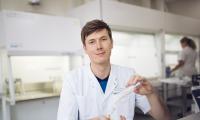Simon Mark Dahl Baunwall
Reliable and effective faecal microbiota transplantation
Simon Mark Dahl Baunwall, doctor and PhD student, is receiving a 2021 Lundbeck Foundation Talent Prize for his research on faecal transplantation.
Certain naturally occurring bacteria must be kept at bay.
One of these is Clostridium difficile (C. difficile). Many of us have this bacterium in our digestive system where it usually lives completely unnoticed along with the many other bacteria in our gut flora.
However, if your immune system is weak – for instance, due to cancer, kidney disease or a chronic intestinal disorder – C. difficile can quickly develop into a nasty, positively life-threatening opponent.
If you take a strong course of antibiotics – to treat an illness such as pneumonia or a urinary tract infection – it will kill many gut bacteria but will not have a noticeable effect on C. difficile. And the change this will cause in the bacterial composition in your gut flora will give C. difficile excellent conditions for spreading.
‘Once the bacteria have spread sufficiently, they cause an infection which initially results in severe diarrhoea. In time, it can also attack and degrade the intestines. You can die of this, and C. difficile has the lives of many immunocompromised patients on its conscience,’ says Simon Mark Dahl Baunwall.
Baunwall is a doctor at Aarhus University Hospital and PhD student at the Department of Clinical Medicine at Aarhus University. He is one of the five young scientists who has been awarded a 2021 Lundbeck Foundation Talent Prize.
Baunwall is receiving the prize for his research on faecal transplantation, a treatment doctors can use to repair the gut flora of immunocompromised patients by giving them a portion of the gut microbiota of a healthy donor.
These bacteria spread and end up colonising – and restoring – the recipient’s gut flora. Baunwall explains that although doctors find the treatment fascinating, to a certain extent they are reluctant to use it:
‘If you use faecal transplantation, you must ensure that you don’t transfer undesirable and, in the worst case, pathogenic microorganisms to the recipient. But if we could create a system with a very high degree of control and safety, it would present interesting opportunities for treating C. difficile infections (CDI, ed.). And this is the kind of system I’ve been involved in developing, together with colleagues at the Department of Clinical Medicine and Aarhus University Hospital. To a large extent it applies the same safety procedures we see in blood banks.’
3,500–4,000 new cases of CDI are diagnosed every year in Denmark. Patients are typically old and their immune systems are already weak. Around 1,000 of these patients experience recurrent infections that doctors simply can’t knock on the head.
Patients in this group, in particular, are offered the “cocktail” of gut microbiota that Baunwall and his colleagues in Aarhus have developed and regularly produce based on faecal samples from an approved group of donors.
‘Donors are screened for risk factors linked to around 200 different disorders and conditions. This greatly reduces the risk of transmitting diseases. It’s a vital element of the safety apparatus on which the entire system is based,’ Simon Mark Dahl Baunwall explains.
‘What’s more, gut microbiota are transferred to the patients using specific, standardised methods. In most cases, they’re give capsules to swallow. These don’t dissolve until they reach the recipient’s gut where the microorganisms from the donor will set to work.’
Faecal transplantation is so effective that more than 90% of the patients who receive a transplant rid themselves of the infection and survive – because their gut flora has normalised and clostridia no longer have free rein.
‘That’s why we receive many requests from hospitals around the country interested in using our capsules for treating patients. And we don't say no. We can supply as many capsules as they need,’ says Simon Mark Dahl Baunwall.
